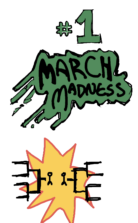Athletes work hard to achieve optimal performance in their sport, but most overlook one simple factor to their everyday training: sleep. Researchers have conducted many studies that point out a correlation between the amount of sleep athletes get and his or her game performance. According to the National Sleep Foundation, the average teenager needs about eight to nine hours of sleep, but an athlete in training needs about one more hour of sleep than the average person because a body pushed in practice needs more time to recover.
The Gatorade Sports Science Institute recently concluded that slow wave sleep, or deep sleep, is crucial for recovery in athletes. Deep sleep occurs during the third and fourth stage of the sleep cycle. During slow wave sleep, growth hormones are released in the body, suggesting that optimal conditions for the body to conduct a metabolic reaction and construct molecules from smaller units through anabolism are most prevalent during sleep.
At Aragon, sleep deprivation seems to affect a variety of athletes. Basketball player senior Paul Su says, “If I don’t get enough sleep, I don’t want to play on the court, which inhibits my chances for improvement. It’s pretty bad because I know I can do so much better if I had just gotten some more sleep.”
One experiment tracked the Stanford University basketball team for several months in 2011. Players added an average of two hours of sleep a night, and their speeds subsequently increased by five percent. The accuracy of their free throws improved by nine percent, and athletes reported to be happier overall.
In addition to the basketball team, another study was conducted on members of the Stanford mens and womens swim teams. When the swimmers increased their sleep hours to ten hours of sleep per night for a duration of six or seven weeks, results showed that the athletes improved in their speed, reaction time, turn times and kick strokes. Swimmers cut off about 0.51 seconds off a fifteen-meter sprint, left the blocks 0.15 seconds faster, shaved one tenth of a second off their average turn time and also added an average of five kicks to their stroke frequency.
Outside of the water, swimmers reported a decrease in daytime sleepiness, increase in energy and improvement to their mood.
Sleep deprivation can have varying effects on different players, causing them to miss shots, skip practice, or feel sleepy during practices and contests.
Basketball player sophomore Weber Su says, “Sleep is important; your body will feel tired the next day [if you don’t sleep], and if you’re in a race or a game, you won’t be performing as well, and will be less likely to win, which affects your team’s performance just as much as it affects your own performance.”
Weber Su recalls a time when sleep deprivation affected his performance in a game.
According to Su, during one of his first basketball games last year, his lack of sleep prevented him from shooting accurately and moving fast on the court. “The other team stole the ball from me a lot, and I lagged around the court. I got so tired, I immediately started sleeping [in the car] when the game ended.”
Moreover, professional athletes also rely on sleep in order to achieve a particular level of performance. For instance, Olympian Michael Phelps would sleep in a chamber that simulated an altitude of 8,500 to 9,000 feet. In that setting, the oxygen would decrease, prompting the production of more red blood cells to bring oxygen to the muscles. In effect, Phleps’s unique sleeping habit would help to improve his blood flow and overall endurance.
In an interview with the Huffington Post, Larry Fitzgerald, receiver for the Arizona Cardinals, said, “I think that’s one of the things that people don’t talk often about. Your body heals and repairs itself better than anything. Being able to get some sleep really does a great cause for your recovery and helping you wake up with a renewed, fresh mental and physical outlook.”
Aragon’s boys basketball head coach Sam Manu offers some insight into athletes’ sleep deprivation tendencies, saying, “I’ve seen athletes function with less sleep, but I believe that at the high school level, they need at least eight hours, and some may need nine to ten.”
Manu offers some advice for sleep-deprived athletes, saying, “Know who you are. Find a good rhythm — find out how much sleep you need, and then follow that pattern. I understand that with all the stress in high school, it’s becoming increasingly difficult for athletes to receive more sleep, but know who you are, and know your limits, and hopefully you will be functioning with improvements not only as an athlete but as a student as well.”



